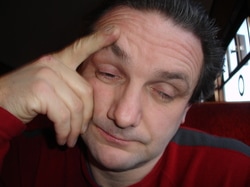The Thursday Thesis - 26/01/201 “Why 8 Hours Might Not be a Recipe for Rest” Personally, I have always been resentful of my need to sleep. There seems to be no real reason for it, and it interrupts me when I’m chasing down the subject of my fascination – or obsession – if you like. I’ll ponder obsession at some future date, I’m sure, but – for now, at least – there’s the tedious business of sleep to think about. More specifically, how to optimise sleep instead of the usual, random “go to sleep when I can’t keep my eyes open a moment longer” or the “eight solid hours” approaches. Firstly, it’s vital to understand the sleep cycle. Research tells us that sleep is not uniform, and that it varies in depth and effect over repeating cycles, each lasting around 90-minutes. Being woken from the very deepest sleep state can leave us feeling dreadful – still tired and disoriented, even if we have been asleep for a long time. But we are closest to waking-up at the end of each 90-minute cycle, so it’s a great idea to plan your sleep to be a certain number of sleep cycles, whether that be 4.5, 6 or 7.5 hours. Notice that the traditional 8-hour sleep will mean waking up 20 minutes or so into a cycle – a deep state – which make us feel grotty. So it’s often better to sleep a part-cycle less, rather than to sleep for part of an extra cycle: bizarrely, six hours of sleep can leave us feeling better than seven hours, due to the sleep state we are woken from. It’s a terrific idea to have a pre-sleep ritual, too, as this prepares you for a decent night’s sleep. The rules for an excellent pre-sleep ritual are: No coffee for two hours before bed. I hate this rule. Caffeine is a stimulant – the last thing we need at bedtime. No food for two hours before bed. Food speeds-up your metabolism – the opposite of what happens when we sleep, so there’s a conflict of metabolic drivers. Incidentally, dairy produce contains naturally-occurring morphine-group chemicals (lactomorphines) that can cause vivid dreams and/or nightmares. Dim the lights for at least 45 minutes before bedtime. Low light (preferably red/orange light) stimulates the release of the sleep-inducing hormone melatonin – which is also associated with brain well-being. No technology for at least 60 minutes before bed. Smartphones, laptops and TV screens all emit high levels of blue-spectrum light, which tricks our brains into thinking it is daylight, inhibiting melatonin production. No TV in the bedroom, and no reading, either. Keep the bedroom sacred for sleep – you’re then telling yourself “I’m in my bedroom – what I do here is sleep.....” Clean sheets - These reassure you that everything is clean and safe, so you relax much better. Get the right pillow height. Too-high or too-low pillows can cause us to hold tension in our necks as we sleep, disturbing our rest. Get a proper mattress. When you choose, remember that calling a mattress “Orthopaedic” doesn’t mean anything – it’s just a marketing word. The best mattress for you is one that supports you reasonably firmly but which does not sag or leave you feeling that you are perched right on top of it. Stay cool. Your body temperature dips during sleep, so don’t overdo the Tog rating of your duvet. Avoid all-night electric blankets, too, and turn down any thermostats in your bedroom. There are also some rituals that can help us to enjoy our waking-up time, too – for example: A sunrise alarm clock, such as those made by Lumie. These devices gradually fade-up the light in a simulated sunrise, sounding an alarm beep once full illumination has been reached. I’m usually awake before the beep, and I’d describe the gentle sunrise alarm as being kissed awake, rather than being kicked awake by more conventional alarms. I do also set a backstop alarm clock, just in case! Power-up the day with an espresso coffee and a light breakfast of nutritious food. I avoid cereals (except oats/porridge) as they are invariably laden with sugar, which has well-documented chronic poison effects. Yes – sugar is a toxin, and it’s been proven and well-known since the 70’s. Get a little exercise. Run if you can, walk if you can’t: ride a bike or pump some iron – do something that kick-starts your metabolism. A refreshing shower is a great way to start the day. Feeling clean is a great boost to our self-esteem, and we can step out in confidence, knowing that we don’t smell kinda peculiar... © Neil Cowmeadow 2017 Please Like and Share The Thursday Thesis with your friends, family, your cat and anyone else. I’d love to hear your comments, along with any ideas you’d care to hurl at me. [email protected]
1 Comment
2/3/2017 09:30:09
There are many questions that we are asking to ourselves and that questions are the things that bothers or makes our mind think of such things that will answer our concerns. We should never regret things that are happening in our lives so that we will be happy and there will be happy moments to look forward in the future. I am thinking that this should be read by the students of the different Universities in the country.
Reply
Leave a Reply. |
Share it with your friends
It's Like This...The Thursday Thesis shares ideas which I think are worth spreading. Archives
May 2022
Categories
All
All content on these pages is the intellectual property of the author, unless otherwise stated, and may not be used in any form or reproduced under any circumstances without the authors permission.
|

 RSS Feed
RSS Feed